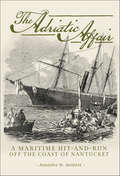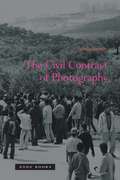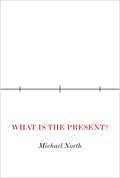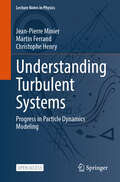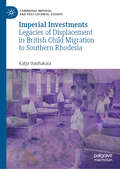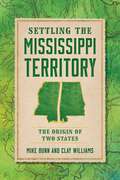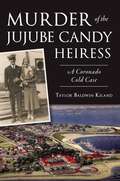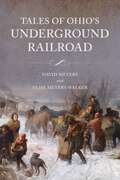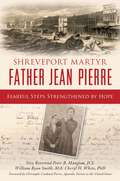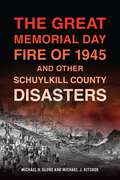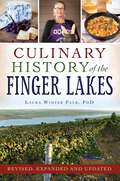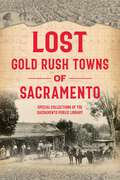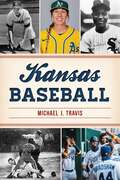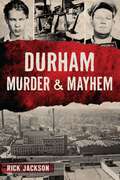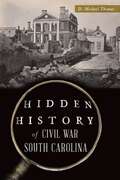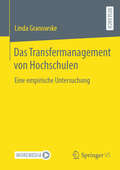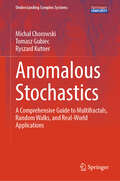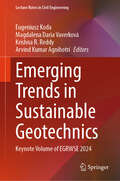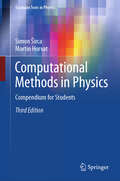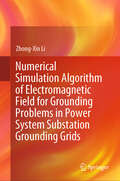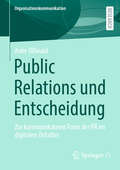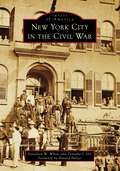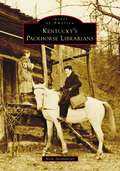- Table View
- List View
The Adriatic Affair: A Maritime Hit-and-Run off the Coast of Nantucket
by Jennifer N. SellittiShipwreck hunter Jennifer Sellitti has researched the Adriatic affair for seven years; her search for information has taken her everywhere from garbage bags in dusty museum basements to the reading rooms at Harvard University.
Paribesh O Bigyan class 6 - West Bengal Board: পরিবেশ ও বিজ্ঞান ষষ্ঠ শ্রেণি
by West Bengal Board of Secondary Educationপরিবেশ ও বিজ্ঞান-VI একটি শিক্ষামূলক গ্রন্থ, যা শিক্ষার্থীদের পরিবেশবিদ্যা ও তার দৈনন্দিন জীবনের সাথে সম্পর্কিত প্রভাব সম্পর্কে সচেতন করে তোলে। বইটি প্রকৃতি, জীববৈচিত্র্য, প্রাকৃতিক সম্পদ এবং টেকসই উন্নয়ন সম্পর্কিত মৌলিক ধারণাগুলি ব্যাখ্যা করে। এটি মানুষ ও প্রকৃতির পারস্পরিক নির্ভরশীলতা তুলে ধরে এবং সংরক্ষণ ও দায়িত্বশীল সম্পদ ব্যবস্থাপনার গুরুত্ব বোঝায়। বইটিতে বাস্তব উদাহরণ, চিন্তাশীল কার্যকলাপ ও সহজবোধ্য ব্যাখ্যার মাধ্যমে দূষণ, জলবায়ু পরিবর্তন ও বাস্তুতন্ত্র ধ্বংসের মতো পরিবেশগত সমস্যা সম্পর্কে আলোচনা করা হয়েছে। পাশাপাশি, এটি বৈজ্ঞানিক নীতিগুলির সঙ্গে শিক্ষার্থীদের পরিচিত করিয়ে দেয়, যা প্রাকৃতিক ঘটনাগুলি বুঝতে সাহায্য করে এবং মানুষের কর্মকাণ্ডের ফলে সৃষ্ট প্রভাব সম্পর্কে অবহিত করে। পাঠ্যক্রমের কাঠামো শিক্ষাগত মানদণ্ডের সাথে সামঞ্জস্যপূর্ণ, যা একে শিক্ষার্থীদের জন্য একটি মূল্যবান শিক্ষার মাধ্যম করে তুলেছে। পরিবেশ ও বিজ্ঞান-VI শিক্ষার্থীদের বিশ্লেষণধর্মী চিন্তাভাবনা ও সমস্যা সমাধানের দক্ষতা গড়ে তুলতে উৎসাহিত করে, যাতে তারা পরিবেশ-বান্ধব অভ্যাস গড়ে তুলতে ও একটি টেকসই ভবিষ্যত গঠনে অবদান রাখতে পারে।
The Civil Contract of Photography
by Ariella AzoulayIn this groundbreaking work, Ariella Azoulay thoroughly revises our understanding of the ethical status of photography. It must, she insists, be understood in its inseparability from the many catastrophes of recent history. She argues that photography is a particular set of relations between individuals and the powers that govern them and, at the same time, a form of relations among equals that constrains that power. Anyone, even a stateless person, who addresses others through photographs or occupies the position of a photograph’s addressee, is or can become a member of the citizenry of photography.The crucial arguments of the book concern two groups that have been rendered invisible by their state of exception: the Palestinian noncitizens of Israel and women in Western societies. Azoulay’s leading question is: Under what legal, political, or cultural conditions does it become possible to see and show disaster that befalls those with flawed citizenship in a state of exception? The Civil Contract of Photography is an essential work for anyone seeking to understand the disasters of recent history and the consequences of how they and their victims are represented.
What Is the Present?: A History of the Here and Now
by Michael NorthA provocative new look at concepts of the present, their connection to ideas about time, and their effect on literature, art, and cultureThe problem of the present—what it is and what it means—is one that has vexed generations of thinkers and artists. Because modernity places so much value on the present, many critics argue that people today spend far too much time in the here and now—but how can we tell without first knowing what the here and now actually is? What Is the Present? takes a provocative new look at this moment in time that remains a mystery even though it is always with us.Michael North tackles puzzles that have preoccupied philosophy, neuroscience, psychology, history, and aesthetic theory and examines the complex role of the present in painting, fiction, and film. He engages with a range of thinkers, from Aristotle and Augustine to William James and Henri Bergson. He draws illuminating examples from artists such as Fra Angelico and Richard McGuire, filmmakers like D. W. Griffith and Christopher Nolan, and novelists such as Elizabeth Bowen and Willa Cather. North offers a critical analysis of previous models of the present, from the experiential present to the historical period we call the contemporary. He argues that the present is not a cosmological or experiential fact but a metaphor, a figurative relationship with the whole of time. Presenting an entirely new conception of the temporal mystery Georg Lukács called the "unexplained instant," What Is the Present? explores how the arts have traditionally represented the present—and also how artists have offered radical alternatives to that tradition.
Understanding Turbulent Systems: Progress in Particle Dynamics Modeling (Lecture Notes in Physics #1039)
by Jean-Pierre Minier Christophe Henry Martin FerrandThis open access book provides a thorough introduction to modeling turbulent, dispersed, two-phase flows. It explains the physical phenomena and governing laws at play, followed by a clear and systematic overview of the statistical tools used to develop simplified or coarse-grained models. With a pedagogical approach, the book uses practical examples to explain complex physical processes and stochastic methods, making it accessible to readers familiar with basic courses in statistical physics and applied mathematics. It also highlights emerging research areas and unexplored challenges in the field. Designed as a self-contained resource, this book is ideal for graduate students and junior researchers in various branches of physics. At the same time, it serves as a valuable reference for experts seeking deeper insights into turbulent, dispersed, two-phase flows.
Imperial Investments: Legacies of Displacement in British Child Migration to Southern Rhodesia (Cambridge Imperial and Post-Colonial Studies)
by Katja UusihakalaThis book examines the legacy of a British child migration scheme that relocated British children to Southern Rhodesia between 1946 and 1962, with the aim of populating the colony with “fresh white stock”. The selected children were resettled at Rhodesia Fairbridge Memorial College, a boarding school established in a disused RAF airbase outside the town of Bulawayo. This social engineering project sought to “rescue” children from what were predicted as undesirable futures in Britain and offer them a “better life” with prospects of social advancement. Yet, beyond individual salvation, the scheme emigrated the children with the intention that they would help sustain the racially segregated colonial order. Building on long-term ethnographic research with former Rhodesian child migrants, now living in the UK, South Africa, Australia, and New Zealand, this book delves into the children’s unique experiences of migration, displacement, and resettlement. By highlighting these enduring emotional, social, and political repercussions, the author critically addresses how colonial histories matter in the present. Through the lens of former child migrants – whose kin relations were ruptured, who were disciplined into silence and suppression, and who have seen scant public recognition of their past – this book sheds light on the formation of memory through its gaps and silences. It contributes to our understanding of memory in relation to forced migration and displaced communities.
Settling the Mississippi Territory: The Origin of Two States
by Mike BunnThe Territory That Built Two States The Mississippi Territory existed as a political entity for nearly two decades. It stretched from the Tennessee border southward to the Gulf of Mexico and was bounded on the east by the state of Georgia and the west by the mighty Mississippi River. This enormous swath of America’s southwestern frontier in 1817 was divided into the state of Mississippi and the Alabama Territory. Two years later, Alabama entered the Union as a state. Between 1798 and 1817, the territory transitioned from a sparsely inhabited backwoods frontier to a thriving and dynamic centerpiece in one of the fastest-developing regions of the country. Mike Bunn and Clay Williams chronicle that story in a richly illustrated introduction and guide to discovery of this pivotal era.
Murder of the Jujube Candy Heiress: A Coronado Cold Case (True Crime)
by Taylor Baldwin KilandOne candy heiress, two bullets and three suspects. The small Southern California island of Coronado rarely makes news for violent crime. But in the spring of 1975, World War II widow and retired librarian Ruth Quinn was murdered, execution-style, in her cottage. Her death sent a shock wave through the community. The granddaughter of Jujubes and Jujyfruits creator Henry Heide, Ruth was found fully clothed with her shoes on, in her bed, dead from two gunshot wounds. To this day, her murder has never been solved, but whispers about her brother, her son and even a local petty thief still swirl.Author Taylor Baldwin Kiland sifts through the dirt for the facts about Ruth’s life and her untimely end in Coronado.
Tales of Ohio's Underground Railroad
by David MeyersAuthors David Meyers and Elise Meyers Walker separate fact from fiction in the story of Ohio’s Underground Railroad. The Underground Railroad was a macabre sort of dance between good and evil in which each side was trying to steal away the other’s partner. However, in the upside-down-world of pre-Civil War America, the law was firmly on the side of evil and the dance often ended in death. It was a time when the newly formed country was deeply divided on the question of slavery and its fate hung in the balance. Just how long could a house divided against itself be expected to stand?
Shreveport Martyr Father Jean Pierre: Fearful Steps Strengthened by Hope
by Dr Cheryl H. WhiteFather Jean Pierre, a missionary priest from Brittany, France, answered a call to serve in sparsely populated Shreveport, where he chose to remain when a yellow fever epidemic struck in 1873. From a perspective told largely through his own words, Father Pierre provides the reader a glimpse of his “fearful steps strengthened by hope.” His unique insights extend even to the secular history, framing the development of Shreveport and the surrounding region in the middle of the nineteenth century. Gradually emerging as someone widely respected and admired for his intellect and ability, Father Pierre’s story culminated in a heroic choice to sacrifice his life in the service of strangers when the epidemic ravaged the city. A trio of authors celebrates the life of this Shreveport martyr.
The Great Memorial Day Fire of 1945 and Other Schuylkill County Disasters (Disaster)
by Michael R. GloreSchuylkill County is no stranger to disaster. Schuylkill County is no stranger to disaster. Protected by volunteers since 1811, residents have faced block-burning conflagrations like the Great Memorial Day Fire of 1945, which consumed sixty-seven buildings in the Mahanoy City Business District, and commercial airplane crashes like United Flight 624 near Ashland, with no survivors. The Red Church propane truck explosion near Orwigsburg caused twelve fatalities, and the Reading Railroad passenger train collision with a gasoline truck in Port Carbon sparked death and destruction, as well as a frantic search for burning money. Telling these stories with the help of rare and many never-before-seen images, authors and veteran firefighters Michael R. Glore and Michael J. Kitsock revisit some of the region’s most harrowing catastrophes.
Culinary History of the Finger Lakes (American Palate)
by Dr Laura Winter FalkThis popular history, recipe and wine pairing book has been fully revised, enhanced and updated. Dive deeper into the traditional cooking and culture of the Haudenosaunee—the first people of the Finger Lakes region. Learn how this unique region was once teeming with salmon and why they no longer breed here. Uncover the speakeasy culture that prospered during Prohibition. Local author, sommelier and educator Laura Winter Falk reveals new regional chefs and their creative takes on period recipes, as well as the tremendous growth in the area’s wine and craft beverages movement. With more excellent producers, restaurants and markets committed to showcasing the bounty of the region, there has never been a better time to discover the unique flavor of the Finger Lakes.
Lost Gold Rush Towns of Sacramento (Lost)
by Sacramento Public Library AuthorityThe Cannibal CityIn the early days of the California Gold Rush, Sacramento City had several competing towns vying for the influx of newcomers. Many of its rivals not only had vibrant multicultural communities but also enjoyed superior geography for transportation and flood control. Even the initial land grant from Johann Sutter is considered controversial if not downright fiction, yet Sacramento thrived where others failed. Once-bustling Mormon Island was initially the proposed site of the railway that would end up bypassing it, and Brighton became a hotbed of agitation after the deadly “Squatters’ Riot,” leading to its decline. Hoboken, Prairie City and more were also wiped off the map. The Special Collections of the Sacramento Public Library explores the history of these lost Sacramentos.
Kansas Baseball (Sports)
by Michael J. TravisBaseball has long been synonymous with Kansas. Go back to the late 1800s and the birth of Walter Johnson and George Sweatt, Humboldt kids who played baseball at the highest level but in different leagues due to racism. Learn about the sixteen-year-old signed by the Kansas City Athletics, who left the University of Kansas campus to play his first game at Municipal Stadium the next day. Read about pioneers in the game named Joyce, Katie and Alex, determined and talented women who are part of our national pastime. Author Michael Travis shares his love for the game, rounding the bases from its beginnings in Wichita with League 42 to the Major Leagues.
Durham Murder & Mayhem (Murder & Mayhem)
by Rick JacksonThe Dark Side of DurhamExplore the dark side of the Bull City. If the red brick walls that once held tobacco warehouses and textile mills could talk, they would tell the tale of how the crossroads settlement of Pin Hook turned into the vibrant city of Durham in the Piedmont of North Carolina. Since its genesis, Durham has been a city where crime was woven into the very fabric of its existence. Over the years, there have been many murders, robberies and shootouts on the streets, in the alleys and on the outskirts of town. Some crimes have caught the attention of the entire nation, but most have remained just in the conscience of the locals. Local historian Rick Jackson narrates the mysteries of one of North Carolina's most important cities.
Hidden History of Civil War South Carolina (Hidden History)
by D. Michael ThomasUntold Stories of the War Between the StatesAll of South Carolina’s history during the Civil War isn’t well known. Author D. Michael Thomas has uncovered fifty accounts of lost history pertaining to the state and its men during the war. These are stories of astounding chivalry and valor in the face of horrific tragedies, along with unprecedented events. A single South Carolinian captured nearly six hundred Union soldiers. Lieutenant Alexander Chisolm had an extraordinary career. See the connection between South Carolina College and its Confederate generals. Learn little-known tales about naval operations from the Union and the Confederacy and witness the recovery of the state’s “Gettysburg Dead.” Join the author as he recounts these hidden stories and more.
History of Modern Tamil Literature Volume 2: புதிய தமிழ் இலக்கிய வரலாறு தொகுதி 2
by Neela Padmanabhan Sirpi Balasubramaniamபுதிய தமிழ் இலக்கிய வரலாறு தொகுதி 2 தமிழ் எழுத்துக்களையும் அதன் முன்னணி எழுத்தாளர்களையும் ஆராய்கிறது. இது 20வது நூற்றாண்டின் தொடக்கமான காலம் முதல் பல முக்கிய மாற்றங்கள், திருப்பங்கள் மற்றும் வளர்ச்சிகளை அணுகுகிறது. தமிழ் சுவடுகளின் பெரும்பான்மையை முன்னெடுத்துக் கொண்ட முக்கிய எழுத்தாளர்களின் கதை இதற்குள் செருகப்பட்டுள்ளது. இந்த நூலில் சிறந்த புனைகதை, கவிதை, நாடகங்கள் மற்றும் கட்டுரைகள் ஆகியவற்றின் பரிணாமங்களை விரிவாக விளக்குகிறது. சமூக மற்றும் அரசியல் மாற்றங்கள், கலாச்சார வளர்ச்சி ஆகியவை இலக்கியத்தை எப்படி பாதித்தன என்பதை தெளிவுபடுத்துகிறது. முக்கியமான எழுத்தாளர்கள் மற்றும் அவர்களது படைப்புகளைப் பற்றிய விவரங்களை நுட்பமாக பதிவு செய்துள்ளது. இதுவே நவீன தமிழ் இலக்கியத்தை புரிந்து கொள்ள ஆர்வமுள்ள வாசகர்களுக்கு அத்தியாவசியமான ஆவணம் ஆகும். இத்தொகுதியின் ஆழ்ந்த ஆய்வு, தமிழின் சமூக-அரசியல் பின்னணிகளுக்கு ஏற்ற இலக்கிய வளர்ச்சியை சரியான முறையில் எடுத்துரைக்கின்றது.
Das Transfermanagement von Hochschulen: Eine empirische Untersuchung
by Linda GranowskeLinda Granowske analysiert in diesem Buch empirisch das Transfermanagement von Hochschulen und untersucht, wie diese die zunehmenden Anforderungen im Spannungsfeld zwischen Wissenschaft und Gesellschaft organisieren und bewältigen. Durch eine umfassende, prozessorientierte Untersuchung werden die Steuerung und Optimierung von Austauschbeziehungen zwischen Hochschulen und ihrer Umwelt analysiert. Der interdisziplinäre Forschungsansatz kombiniert verwaltungswissenschaftliche, betriebswirtschaftliche und organisationstheoretische Perspektiven, um zentrale Akteure und Managementinstrumente systematisch zu erfassen. Im Ergebnis werden innovative Ansätze für das Transfermanagement entwickelt, die sowohl theoretisch fundiert als auch praktisch umsetzbar sind.
Anomalous Stochastics: A Comprehensive Guide to Multifractals, Random Walks, and Real-World Applications (Understanding Complex Systems)
by Michał Chorowski Tomasz Gubiec Ryszard KutnerThis textbook provides a comprehensive exploration of anomalous stochastic processes and extreme events, commonly referred to as "black swans," with a particular focus on (multi-)fractal approaches and continuous-time random walks. The authors present a systematic examination of the subject, tracing its inception and providing a multi-directional perspective. By drawing on real-world experiences in finance, physics, and technology, the book underscores the practical relevance of anomalous stochastic processes for practitioners dealing with real-world data from complex systems. The content is based on a series of interdisciplinary physics lectures that have been delivered to undergraduate and graduate students at the University of Warsaw for nearly two decades. Updated to reflect recent developments, this book is a valuable resource for graduate students, ambitious undergraduate students, and researchers interested in random processes and the practical implications of anomalous processes. Familiarity with fundamental principles of probability theory, algebra, and basic concepts of differential and integral calculus is assumed, while a foundational understanding of mathematical statistics, stochastic processes, and statistical thermodynamics is recommended. Additionally, each chapter includes practical exercises designed to help readers master the concepts, develop practical skills, and serve as teaching material.
Emerging Trends in Sustainable Geotechnics: Keynote Volume of EGRWSE 2024 (Lecture Notes in Civil Engineering #584)
by Krishna R. Reddy Arvind Kumar Agnihotri Eugeniusz Koda Magdalena Daria VaverkováThis volume contains peer-reviewed and selected papers presented during the International Conference on Environmental Geotechnology, Recycled Waste Materials, and Sustainable Engineering 2024, held in Warsaw, Poland. It covers the recent innovations, trends, concerns, practical challenges encountered, and the solutions adopted in waste management and engineering, geotechnical and geoenvironmental engineering, infrastructure engineering, and sustainable engineering. This book will be useful for academics, educators, policymakers, and professionals working in the field of civil engineering, chemical engineering, environmental sciences, and public policy.
Computational Methods in Physics: Compendium for Students (Graduate Texts in Physics)
by Martin Horvat Simon ŠircaThis textbook provides a compendium of numerical methods to assist physics students and researchers in their daily work. It carefully considers error estimates, stability and convergence issues, the choice of optimal methods, and techniques to increase program execution speeds. The book supplies numerous examples throughout the chapters that are concluded by more comprehensive problems with a strong physics background. Instead of uncritically employing modern black-box tools, the readers are encouraged to develop a more ponderous and skeptical approach. This revised and expanded edition now includes a new chapter on numerical integration and stable differentiation, as well as fresh material on optimal filtering, integration of gravitational many-body problems, computation of Poincaré maps, regularization of orbits, singular Sturm-Liouville problems, techniques for time evolution and spatial treatment of (semi)infinite domains in spectral methods, and phase retrieval. It also brings updated discussions of algebraic problems involving sparse matrices and of high-resolution schemes for partial differential equations.
Numerical Simulation Algorithm of Electromagnetic Field for Grounding Problems in Power System Substation Grounding Grids
by Zhong-Xin LiThis book focuses on numerical methods for grounding problems in substation grounding systems, which are rooted in horizontal multilayered earth models. The book discusses both theories and engineering applications and provides case studies to verify the accuracy of the methods introduced. Up to ten horizontal multilayered soil models were considered. This book employs numerical algorithms for Galerkin&’s method, including Galerkin&’s method of moments, Galerkin&’s boundary element method, and hybrid algorithms based on a variety of basis functions that have emerged as a result of simplifying Galerkin&’s method of moments. These numerical methods include both frequency and time domain algorithms that can be used to numerically simulate transient and steady state grounding problems in substation grounding grids. The most outstanding feature of this book is the incorporation of the frequency- and time-domain quasi-static complex imaging method (QSCIM) for point current sources in layered conducting media and its closed-form Green&’s function, as well as analytical algorithms for calculating the spatial two-dimensional line integrals of mutual impedances and inductances into numerical algorithmic modeling of electromagnetic fields, which greatly improves computational speed and accuracy.
Public Relations und Entscheidung: Zur kommunikativen Form der PR im digitalen Zeitalter (Organisationskommunikation)
by Anke OßwaldAnke Oßwald entwickelt in dem vorliegenden Buch eine entscheidungsorientierte Perspektive auf Public Relations. Aufbauend auf einem systemtheoretischen Kommunikationsverständnis konzipiert sie PR als spezifische Entscheidungspraxis und zeigt, welche weitergehenden Erkenntnismöglichkeiten damit verbunden sind. So lassen sich unter anderem Automatisierungsprozesse deutlich differenzierter darstellen und die Folgen für Öffentlichkeit diskutieren. Neue Impulse ergeben sich auch für die Schnittstelle von PR- und Organisationsstudien sowie für die kommunikationswissenschaftlich ausgerichtete Strategieforschung.
New York City in the Civil War (Images of America)
by Jonathan W. WhiteNew York City was the center of business, commerce, manufacturing, culture, and war spirit in the North during the Civil War. Abraham Lincoln gained an important national audience at the Cooper Institute in February 1860. Tens of thousands of young men enlisted in the city and marched off to fight. Factories churned out materiel for the soldiers. Black leaders such as Frederick Douglass mobilized African American support for the Union. Foreign dignitaries were the subject of grand celebrations on Broadway. Immigrants raised celebrated ethnic regiments, and nationally renowned newspapers debated the pressing issues of the day. In short, the city was a vital engine that powered Union efforts. Yet New York was also a divided metropolis where political differences were hashed out—sometimes violently. The deadliest urban racial violence in American history took place in Manhattan in July 1863. In this book, New Yorkers regain their place at the center of the Union war effort on both the battlefield and the home front.Acclaimed historians Jonathan W. White and Timothy J. Orr bring New York City’s Civil War story to life through photographs and illustrations drawn from libraries, archives, and private collections around the United States. Foreword author Harold Holzer is the Jonathan F. Fanton Director of the Roosevelt House Public Policy Institute at Hunter College and a leading historian of Lincoln and the Civil War in New York City.
Kentucky's Packhorse Librarians (Images of America)
by Nicki JacobsmeyerMarking the ridgelines and hearts of the Appalachians during the Great Depression, packhorse librarians delivered hope, one book at a time.When the Great Depression started, folks stumbled on hard times. Many lost their jobs and homes, and they struggled to support their families. But people craved hope for the future, and hope arrived with the packhorse librarians through Pres. Franklin D. Roosevelt’s New Deal in 1933. Each week, children, families, and schoolhouses celebrated when their packhorse librarian arrived at their doors with books. After being handled by many cherished hands, reading materials needed to be taken out of circulation. The librarians constructed scrapbooks and filled them with beloved items—recipes, quilt patterns, pictures, and stories. Challenges awaited the librarians at every pass. From muddy creeks to snowy hillsides, the packhorse librarians delivered books and hope to their patrons. Although the program ended in 1943, the lasting effects on literacy and the communities these packhorse librarians visited can still be seen today.Author Nicki Jacobsmeyer lives in rural Missouri, where she writes fiction and nonfiction for adults and children. She inspires others to discover and dream through reading and believes books are windows to the world.
